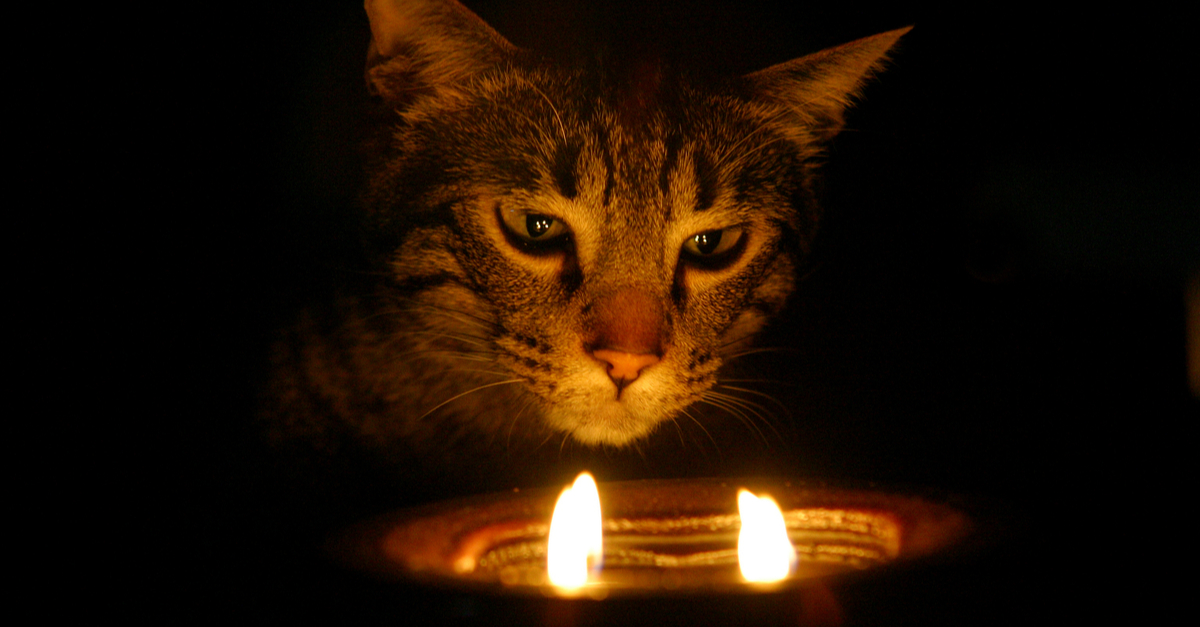No one wants a trip to the veterinary emergency room, a vomiting cat, or a down dog to spoil the holiday season—let alone empty out the family wallet. Here’s how to avoid mishaps and keep pets happy.
Candles Burn Bright: Curiosity can kill. If a candle is knocked over, a house fire can start. A pet can get singed brushing against a candle. Scented candles can be life-threatening to birds due their sensitive respiratory systems. The best candles may be the kind you plug in.
Stress Is Contagious: Holiday time is frenetic, with shopping, decorating, last-minute work projects, and guests arriving. Pets pick up on our anxiety, and they become anxious as well, often because their schedules are askew. Try to spend some time outside playing with the dog or using an interactive toy to entice your cat to chase and pounce. Or talk to your bird about your unrealistic boss and your crazy schedule. It can be a cathartic outlet for you and a means to give your pets some attention on something close to a structured schedule. Pets are family members and worth at least 15 minutes of attention daily.
Meet the Relatives: Some pets are social butterflies, others not so much. A constant flow of relatives can be traumatic to some pets (even more than it is to you). Don’t force pets to interact with Aunt Gloria and Uncle Jay if they don’t want to. In fact, it may be best to seclude anxious pets in a sanctuary room, such as a den, second bedroom, or basement. Plug in a pheromone diffuser to naturally reduce stress and offer brain-teasing food puzzles. Put on classical music or easy-listening tunes to minimize the sounds of squabbling family members.
Good Housekeeping: Some pets, especially puppies and kittens, like to munch on errant Christmas tree needles. They can choke on them or suffer a serious upset tummy. Birds can perch on plastic trees, but they shouldn’t be allowed to munch on plastic needles.
Avoid Prickly Christmas Trees: When choosing a tree, consider one with pet-friendly pliable needles such as a Douglas fir or white pine. They won’t stick in your pet’s paws. (They’re also easier to vacuum.)
Deck the Halls: Kissing under the mistletoe is romantic but keep toxic mistletoe out of your pet’s reach. Poinsettias aren’t a life-threatening hazard, but they’re still not a healthy choice for pets to munch and should be kept out of reach as well.
Treats, Not Feasts: During holidays, we may all suffer from “grandma syndrome,” expressing love by feeding our pets treats. A tiny tidbit of turkey, chicken, or ham or some slices of carrot or apple isn’t likely to harm most pets, but the problem arises when you overdo it. Giving a dog or cat a few slices of turkey is like an adult human eating half the bird. Sometimes multiple well-meaning guests sneak food to your pet when you’re not looking, so pets are getting far more than you think. Or maybe it’s sneaky dumpster diving or counter surfing. Most important, eating fat or skin can lead to a dangerous and painful inflammation of the pancreas called pancreatitis. Swallowing bones may also be life threatening, causing an obstruction requiring emergency surgery. Don’t trust that because he’s never before swiped food from countertops or trash that Christmas dinner won’t see temptation override training.
Holiday Treats to Die For: Beware of thoughtful guests bringing baked goods made with a sugar substitute called Xylitol. If pets sneak a bite or a whole panful of the brownies left for St. Nick, the result may be catastrophic. Xylitol is deadly to pets (and chocolate is well known to be toxic, too). If you’re serving margaritas and guacamole, what a fun party. However, do know that avocado can make pet birds very ill.
Ban Tinsel and Ribbon: Cats and puppies are so fascinated by tinsel and ribbon they may make a meal of it, which keeps veterinarians in surgery on Christmas, removing these hazardous linear foreign bodies.
Cats Will Be Cats: From your cat’s perspective, Christmas trees may be the best gift ever. Except for elderly or obese cats, expecting that your kitty won’t scamper up the tree is not realistic. Don’t risk hanging fragile antique or glass ornaments on the tree. Display these somewhere else. A small latticework fence around the base of the tree will prevent most cats from being able to climb. Secure the tree to the ceiling or wall with fishing line.
Water Hazard: Bizarre additives to lengthen Christmas tree life include chicken soup, Vitamin C, dog urine (yuck!), bleach, or even birth control pills. Aside from potentially making that water your tree sits in dangerous for a pet to drink, experts suggest there’s nothing you can add that’s likely to make your tree last longer (aside from fresh water). A tree-skirt that covers the stand prevents your pet from drinking this water.
Family Affair: As the family gathers to open presents, include everyone, even those with fur, feathers, or scales. Oftentimes, pets will easily sniff out which gifts are for them. Moreover, you’re teaching children that all lives do matter.
Happy holidays!
This article was reviewed/edited by board-certified veterinary behaviorist Dr. Kenneth Martin and/or veterinary technician specialist in behavior Debbie Martin, LVT.








